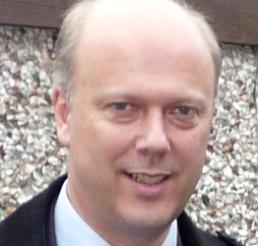The charity sector is putting too much emphasis on campaigning and not enough on service delivery, Justice Secretary Chris Grayling told an audience of charity leaders last night.
Speaking at a social welfare debate in London, organised by the Lord Mayor’s Charity Leadership Programme, Grayling said there was currently discussion about how much weight should be given to three issues – contracting, fundraising and campaigning.
“I disagree strongly with the campaigning side,” he said. “People talk about the amount MPs are lobbied by big business. But I would say that there is 20 to 30 times as much lobbying from the charitable sector, perhaps even more.
“I see there are big national organisations with active, well-funded campaigning groups at the centre, but with cash-strapped branches trying to provide services on the ground in communities, and I think 'are you sure you've got the balance right?'
“From the point of view of a constituency MP it doesn't feel right at all.”
'The sector must behave in a commercial way'
Grayling also said that the sector had to adapt in order to contract with government.
“The sector itself has to behave a reasonably commercial way,” he said. “If you want to win a government contract, you’ve got to be able to do a genuine business deal. We try to facilitate opportunities for the sector but we can't provide it on a plate.”
He said the lesson he had taken from the Work Programme and Transforming Rehabilitation was that the sector needed to build more commercial skills, and that he had explained this lesson to Acevo, the NCVO and to contracting organisations.
He said that change was inevitable for charities, because previous government methods of engaging with the sector had been too inefficient.
“In both of these programmes the social sector is enormously important, both for big organisations like Tomorrow's People and the Shaw Trust, and smaller niche organisations,” he said. “We've tried to create a level playing field.”
But he said the sector also had to change to meet government’s needs.
“Before the Work Programme the Department for Work and Pensions contracted with 1,200 charities,” he said. “With the best will in the world that's not really terribly viable. It's much more difficult to manage large numbers of charities.”
Grayling said he did not agree with criticism from members of the audience who said they could not afford to become involved in payment-by-results programmes which took a long time before they paid out to contractors.
“I don’t believe payment-by-results puts any constraints on the sector,” he said.
He said that charities should be able to get funding from prime contractors who had the balance sheet to fund smaller organisations during delivery, or they should be able to attract social investment to fund a payment-by-results contract.
He said it was a concern that charities might be used as “bid candy” but that protections such as the Merlin Standard had been introduced to prevent this happening. He said he had been prepared to take action to protect charities but they had not approached him with the evidence needed to do so.
“It would have made my life much easier if I had been able to sack a prime contractor just to make the point I was willing to,” he said.
'We will win prime contracts and do it better'
Roy O'Shaughnessy, chief executive of the Shaw Trust, speaking at the same event, echoed many of Grayling’s comments and that there were more and more charities which could compete for government prime contracts.
“There are a number of organisations which have been building infrastructure in the last 30 years,” he said. “If there was ever a time we could win business from the Sercos of this world, it's now.
“It's not easy having a charitable heart and a commercial brain, but it has advantages. Last year we invested £7.2m in the community which in another company would have been given to shareholders.
“I would encourage any charity which wants to be a prime contractor. We will win these contracts and do it better.”









